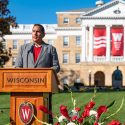Meet the 2024 Academic Staff Excellence Award winners
Each year, the University of Wisconsin–Madison recognizes outstanding academic staff members who have excelled in leadership, public service, research and teaching. These exceptional individuals bring the university’s mission to life and ensure that the Wisconsin Idea extends far beyond the campus and the state. The following 10 employees are recipients of 2024 Academic Staff Excellence Awards.
Chancellor’s Hilldale Award for Excellence in Teaching
Bárbara Rodríguez-Guridi
Spanish 203 coordinator, Department of Spanish & Portuguese
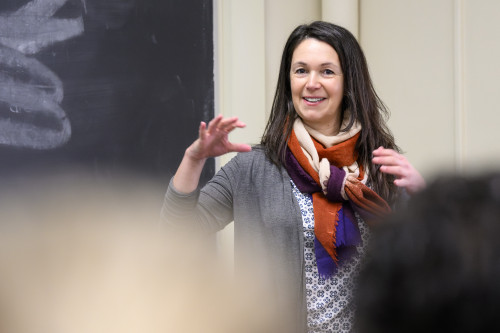
Barbara Rodríguez-Guridi, Spanish language coordinator and teaching faculty in the Department of Spanish and Portuguese Photo: Althea Dotzour
When COVID-19 struck, Bárbara Rodríguez-Guridi initiated an ambitious collaboration with a university in Colombia. The innovative partnership allowed her pandemic-confined Spanish-language students to “travel” to a Latin American country for fruitful, bi-weekly conversations with native Spanish-speaking students. The approach was so successful that other instructors adopted it.
It’s a powerful example of how Rodríguez-Guridi meets pedagogical challenges with energy and creativity. Students love her engaging assignments, like having them interview Hispanic members of the Madison community in Spanish. Her student course evaluations are over the top — a mean score of 3.9 out of 4.0. As one student put it, she “embodies kindness, fairness, wisdom and fun.”
A masterful instructor of Spanish, Rodríguez-Guridi excels just as much as an instructor of instructors. She earns high praise for training and mentoring teaching assistants, providing them with a strong scaffolding for success. And her colleagues rave about her leadership and professional generosity, which have helped the department attain a national reputation for excellence.
♦
“Dr. Rodríguez-Guridi inspires students by bringing her enthusiasm for Spanish into the undergraduate classrooms and by providing constant opportunities for our graduate students to grow as educators.”
— Fernando Tejedo, professor and chair, Department of Spanish & Portuguese
WISCIENCE Lillian Tong Teaching Award
Jim Reardon
Director of undergraduate program, Department of Physics
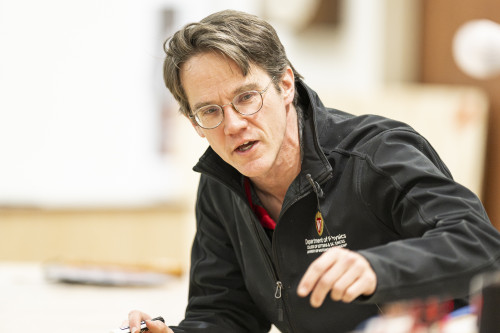
Jim Reardon, director of undergraduate program in the Department of Physics Photo: Bryce Richter
Jim Reardon’s love of running and his excellence as a physics instructor recently came together in the classroom in a big way with Physics 106: The Physics of Sports, a course he developed and now teaches. The new course applies physical principles to competitive sports, helping students better understand athletic performance. It’s proven exceptionally popular, attracting almost 140 students in only its third semester.
Reardon’s expertise at course development, his mastery at instruction and his exemplary support of teaching assistants have made him indispensable to the Physics Department. As director of the undergraduate program, he implemented standardized assessments in the department’s large introductory courses. This provided a baseline for successful course modifications and allowed nationwide peer assessment comparisons. As the administrator of the teaching assistant program, Reardon expertly matches the strengths of TAs with the needs of the department.
Reardon is no less valued in the classroom. Students routinely give him the highest of marks. Writes one, “I have never seen a professor or teacher work so effectively and patiently to ensure his students understood the information.”
♦
“Jim is unique in his broad and ready grasp of the subject matter combined with a passion for teaching and making sure that ALL students have access to that subject matter.”
— Sharon Kahn, graduate program manager, Department of Physics
Chancellor’s Award for Excellence in Service to the University
Benjamin Griffiths
Senior university legal counsel, Office of Legal Affairs
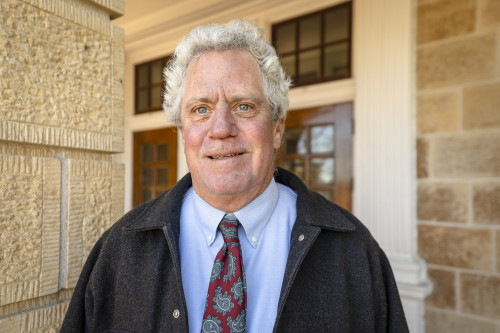
Ben Griffiths, senior university legal counsel in the Office of Legal Affairs Photo: Taylor Wolfram
Some lawyers think of themselves merely as problem stoppers. Benjamin Griffiths goes beyond rendering legal advice to become a collaborative problem solver.
During his 30 years with the Office of Legal Affairs, the recently retired Griffiths helped the university expertly navigate sticky real estate transactions, complex contract negotiations, thorny research and policy questions, and much more. He served five chancellors and worked closely with leaders across campus and at key university-affiliated organizations, including the Wisconsin Alumni Research Foundation and the Wisconsin Foundation and Alumni Association.
With his unparalleled depth of knowledge, can-do spirit and phenomenal recall, Griffiths was a trusted and indispensable asset — “an institution within an institution,” as one nominator put it. On top of that, he was a pleasure to work with. Raves one colleague, “No one doesn’t smile when they see Ben walk into a room.”
♦
“Few attorneys are capable of excelling in a practice as impactful and broad-based as Ben, but in each case, he distinguished himself as a gifted and trusted colleague and advisor who embodied the spirit of the Wisconsin Idea and prioritized the well-being of this public research flagship.”
— Nancy K. Lynch, vice chancellor for legal affairs
Chancellor’s Award for Excellence in Research: Independent Investigator
Timothy McGuine
Distinguished scientist, Division of Sports Medicine, Department of Orthopedics and Rehabilitation
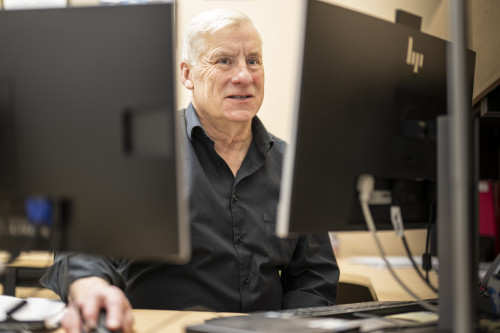
Timothy McGuine, distinguished scientist in the Dept. of Orthopedics and Rehabilitation Photo: Bryce Richter
Timothy McGuine began his career as an athletic trainer and remains one at heart. His “on the sidelines” expertise imbues everything he researches, contributing to his national reputation as an expert on injury prevention in adolescent athletes.
McGuine’s 81 peer-reviewed papers address some of the most pressing issues facing young sports participants, from reducing concussions and ankle injuries to the efficacy of football helmets and soccer headgear.
Recently, he took a leading role in researching the impact of youth sports participation on overall health during the COVID-19 pandemic, becoming among the first to present on this emerging topic.
One of McGuine’s most important contributions has come in the standard he has set for clinical field research. His multi-site studies take place at the point of injury and at the point of care. McGuine’s studies also have had a profound impact on professional clinical practice — one ankle injury and balance intervention study, for example, has been cited over 1,500 times.
♦
“Dr. McGuine has crisscrossed the state, time and time again, putting thousands of miles on his car in an effort to educate high school athletes, their parents, athletic directors and athletic trainers regarding his population-based studies and the impact they would have on the participants and on the lives of others.”
— Tamara A. Scerpella, professor and chair, Department of Orthopedics and Rehabilitation
Chancellor’s Award for Excellence in Research: Critical Research Support
Carla Schubert
Researcher III, Department of Population Health Sciences
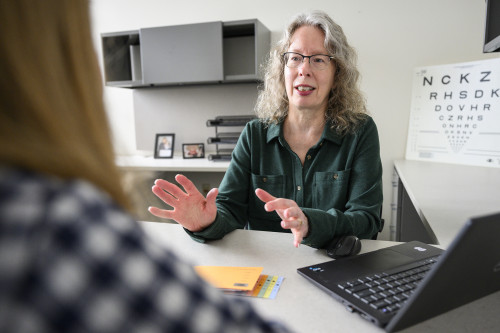
Carla Schubert, researcher with the School of Medicine and Public Health Photo: Althea Dotzour
Schubert, who joined the EpiSense Group in 1998, was key to the 2004 launch of the Beaver Dam Offspring Study, an ongoing longitudinal study with thousands of participants that aims to understand how the senses and the brain age together over time. Her seminal contributions to another large ongoing study, the Epidemiology of Hearing Loss Study, are equally heralded.
Schubert has been integral to an astounding 74 peer-reviewed publications, including 21 as first author. She is internationally recognized as a leading expert on the epidemiology of olfactory impairment.
More recently, Schubert has made novel contributions in the study of human exposure to common neurotoxins, a complex field with implications for public health interventions.
♦
“Carla functions as a true colleague and collaborator, generating new hypotheses and directions for our research, publishing important papers and writing major sections of the grants that support our work.”
— Karen J Cruickshanks, professor emerita, founder of EpiSense Group
Chancellor’s Award for Excellence in Leadership: Individual Unit Level
William Schwab
Professor (clinical health sciences), Department of Family Medicine and Community Health
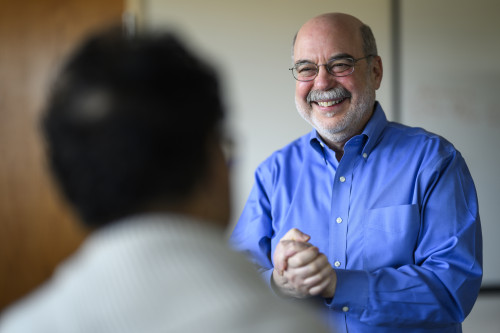
William Schwab, professor in Family Medicine and Community in the School of Medicine and Public Health Photo: Althea Dotzour
The spring of 2020 brought unprecedented challenges to the Department of Family Medicine and Community Health. In addition to a global pandemic, the department was reeling from staff exhaustion, the departure of its longtime chair and the senseless double homicide of a beloved faculty member and her husband.
Many potential leaders would have backed away; William Schwab stepped up. As interim chair for 18 months, the trusted clinical faculty member led with compassion and inspired by example. His daily emails to staff continue to be cherished for their solace and wisdom.
Schwab’s decades-long, relationship-centered leadership has helped grow the department’s residency program — including its highly respected rural training tracks — into one of the best in the country. Schwab currently co-leads the newly established LGBTQ+ fellowship funded by the American Medical Association Foundation.
U.S. News & World Report ranked UW’s family medicine program No. 5 in the country in 2023. The recognition would not have been possible without Schwab’s contributions, his colleagues say.
♦
“I would best describe Bill as a village elder, someone who holds people’s respect, trust and attention and are the true leaders of a group.”
— David Rakel, professor and chair, Department of Family Medicine and Community Health
Chancellor’s Award for Excellence in Leadership: School, College or Larger University Level
Barbara Anderson
Director, Office of Continuing Professional Development, School of Medicine and Public Health
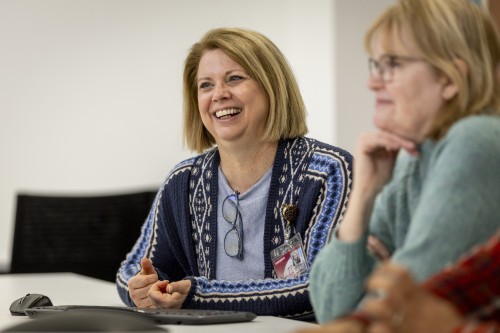
Barbara Anderson, director of continuing professional development in the School of Medicine and Public Health Photo: Taylor Wolfram
Since becoming director of the Office of Continuing Professional Development in 2014, Barbara Anderson has expertly spearheaded efforts to change the focus and philosophy of continuing education for health professions programs at UW–Madison.
In one standout accomplishment, Anderson helped create the UW–Madison Interprofessional Continuing Education Partnership, bringing together the continuing education programs of nursing, pharmacy and medicine and public health. Her approach, undertaken with confidence and grace, facilitated collaboration and learning across a growing number of health professions. The result was transformative: expanded skillsets for participants and improved outcomes for patients. As one clinician succinctly put it, “Patients now receive safer care.”
Due to Anderson’s efforts, the ICEP was one of the first academic centers in the country to achieve the maximum six-year term from a new national body that bestows joint accreditation across units. The partnership recently earned a second six-year term “with commendation,” a designation recognizing its status as a national change agent for quality improvement.
♦
“Barb consistently demonstrates innovative leadership, exemplary problem-solving skills and a remarkable capacity for critical thinking that dramatically advances the impact of our education mission in a vitally important area.”
— Robert N. Golden, dean of the Wisconsin School of Medicine and Public Health
Robert and Carroll Heideman Award for Excellence in Public Service and Outreach
David A. Hart
Senior scientist, Aquatic Sciences Center and Assistant director, Sea Grant Program, Office of the Vice Chancellor for Research
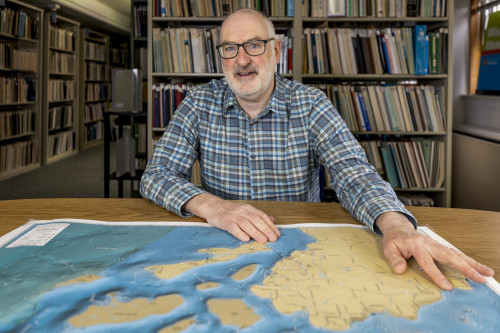
David Hart, assistant director for Extension in the Sea Grant Aquatic Sciences Center Photo: Taylor Wolfram
Wisconsinites cherish Lake Superior and Lake Michigan. David A. Hart has spent his career with UW–Madison working to keep these lakes — and all the Great Lakes — healthy and widely accessible to the public.
A dynamic presenter and educator, Hart expertly bridges the divide between research and practice. He distills complex information into engaging stories that deepen the public’s connection to and support of these treasured natural resources.
Hart’s impact is twofold. As an expert in geospatial technologies, he uses innovative mapping and analysis tools to support sustainable coastal development and help coastal residents make better decisions in areas like bluff stability and climate risks. As director of the Wisconsin Sea Grant Extension Program, he has grown the skills of the extension staff as they help improve water quality, restore habitats, inspire schoolchildren and boost the tourism and aquaculture industries.
From 2019-2023, Hart served as the chair of meetings of the Sea Grant Extension Program Leaders in the Great Lakes region and represented their interests on the Sea Grant Extension Assembly.
♦
“We continue to be in awe of all that David has accomplished through his 30-year career and the environment that he has helped create to support the Wisconsin Idea and the Great Lakes.”
— Tim Campbell, aquatic invasive species program manager, Wisconsin Sea Grant
Martha Casey Award for Dedication to Excellence
Clare Huhn
Institutional policy analyst, Data, Academic Planning & Institutional Research
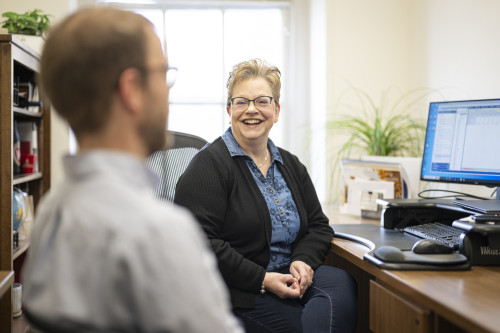
Clare Huhn, distinguished institutional policy analyst in Data, Academic Planning & Institutional Research Photo: Bryce Richter
When UW–Madison decision-makers need key metrics about the institution’s operations and a sharp analysis of what they mean, they turn to Clare Huhn.
Huhn brings more than 30 years of cross-campus knowledge, a long institutional memory and a keen mind to her work. She knows the precise clarifying questions to ask to get to the heart of a data request. Colleagues at the College of Letters & Science even coined a word for this magical skill: It’s a “Clare-i-fication!”
Huhn’s data skills, analytical acumen and constructive and practical solutions have provided the backbone for many campus policies and processes. Her efforts have led to the implementation of campus budget and enrollment models and initiatives to boost student success, such as improvements in course access. “Her work is everywhere and seemingly touches or supports everything,” enthuses one nominator.
Described as an amazing collaborator, Huhn performs this work with patience, good humor and meticulous attention to detail. “She is indeed an unsung hero who is a linchpin for many vital campus processes,” writes an admirer.
♦
“Clare’s dedication to providing reliable and timely information has directly contributed to many strategic efforts, advancing UW–Madison’s missions.”
— Allison La Tarte, vice provost for data, academic planning and institutional research
Martha Casey Award for Dedication to Excellence
Edward “Teddy” Kaul
Academic advising manager and graduate program coordinator, Department of Art History
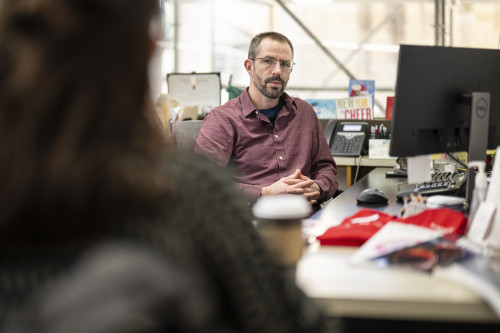
Edward “Teddy” Kaul, academic advisor in the Art History Department Photo: Bryce Richter
Art History is experiencing a gratifying growth spurt, with enrollments in the department’s undergraduate courses surging 87% from fall 2021 to fall 2023. The number of majors and certificate students grew roughly 25% during the same period.
This growth simply would not have happened without the guidance of Edward “Teddy” Kaul, his colleagues say. Kaul drew on more than a decade of experience in the department and his many years of student advising to help faculty members craft new courses that excite today’s undergraduates and speak to the increasing relevance of art history in a world becoming more diverse and visually oriented.
Kaul convinced colleagues to boost the number and dynamism of the department’s introductory offerings, leading to courses like Art History 102: Seeing through Conspiracy Theories and Art History 107: The Body, Sex and Health in Art. An admiring faculty member calls it “a total overhaul of our entry-level curriculum.”
One result: Interest in several 100-level courses now surpasses the 250+ capacity of many of the largest lecture halls.
♦
“It is not hyperbolic to say that Teddy has helped transform the department, increasing its vibrancy and relevance to UW students.”
— Jennifer Pruitt, Howard and Ellen Louise Schwartz Associate Professor of Islamic Art
Tags: academic staff, awards


